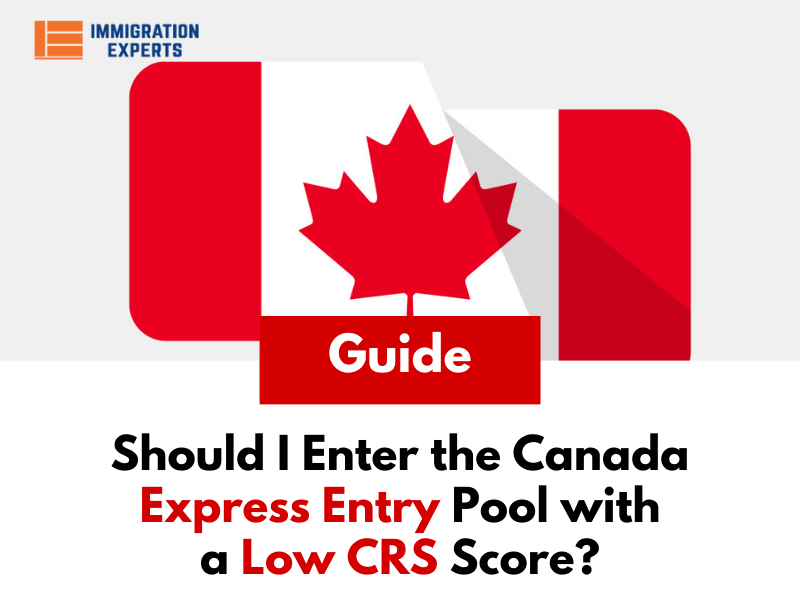051 8439995, 042 35911332

The Express Entry-managed programs are highly favored by skilled individuals looking to move to Canada. This is because Immigration, Refugees, and Citizenship Canada (IRCC) aims to process Express Entry applications within six months, making it one of the quickest routes to becoming a permanent resident of Canada.
Getting an invitation to apply (ITA) for permanent residency through Express Entry depends largely on a candidate’s Comprehensive Ranking System (CRS) score. The higher a candidate scores on the CRS, the better their chances of receiving an ITA.
Various factors like age, work experience, occupation, language skills, and education determine a Comprehensive Ranking System (CRS) score.
In recent Express Entry draws, particularly the general ones, the minimum CRS scores have been above 500. However, as of February 28, there are 18,106 candidates in the Express Entry pool with scores above 500, out of a total of 211,487 candidates.
To put it simply, less than one-tenth of Express Entry candidates have scored high enough to be considered in a general draw so far in 2024. This might make those with scores below 500 wonder if it’s still worth applying through Express Entry or if they should explore other options for immigrating to Canada.
Latest Express Entry Draws Overview
The minimum Comprehensive Ranking System (CRS) score needed to receive an Invitation to Apply (ITA) can vary with each Express Entry draw and is influenced by the type of draw being conducted—whether it’s general, program-specific, or category-based.

In 2024, CRS scores have shown significant differences across the ten Express Entry draws conducted as of March 12.
Six of these draws were general, where candidates from all Express Entry programs and categories were considered. The CRS scores for these draws ranged between 525 and 541.
If you’re considering settling in the USA, the EB2 NIW visa stands out as an exceptional choice for you.
The remaining four draws were for candidates eligible through category-based selection. In these particular draws, CRS scores have typically exhibited lower ranges compared to general draws, fluctuating between 336 and 437, contingent upon the particular category involved.
Category-Based Express Entry Draws
Category-based selection draws were introduced by IRCC in May 2023 to target Express Entry candidates with specific in-demand attributes. These categories include occupations in healthcare, STEM fields, trades, transportation, agriculture, and agri-food, as well as candidates with strong French language skills.
For instance, candidates with strong French language skills saw the lowest score of the year so far, which was 336 in a draw on February 29. Another draw in the same category on February 1 issued 7,000 ITAs to candidates with a CRS score of 365.
What this implies is that candidates with CRS scores too low for a general draw still have opportunities to receive an Express Entry ITA if they are eligible for category-based selection. Last year, IRCC invited over 16,000 Express Entry candidates through category-based draws.
Understanding Express Entry
Express Entry is a system that manages applications for three main Canadian immigration programs: the Federal Skilled Worker Program (FSWP), the Federal Skilled Trades Program (FSTP), and the Canadian Experience Class (CEC).

Individuals who want to apply for these programs must first assess if they meet the eligibility requirements. If they do, they must create and submit an Express Entry profile online to receive their Comprehensive Ranking System (CRS) score. This score evaluates various factors such as age, education, work experience, language proficiency, and other criteria.
After obtaining their CRS score, applicants must wait for an Invitation to Apply (ITA) from Immigration, Refugees and Citizenship Canada (IRCC). If they receive an ITA, they can then proceed with their application for permanent residence in Canada.
Strategies for Improving Your Score
To enhance their Comprehensive Ranking System (CRS) score while waiting for an Invitation to Apply (ITA) in Express Entry, candidates can focus on improving various aspects of their profile:
- Language Skills: Language proficiency is crucial, as it significantly influences economic integration. Candidates can aim for higher scores in language tests recognized by Immigration, Refugees and Citizenship Canada (IRCC), such as the CELPIP General Test, IELTS General Training, Pearson Test of English (PTE) Core, TEF Canada, and TCF Canada. Achieving higher language proficiency levels can significantly boost CRS scores.
- Education: Obtaining higher levels of education earns candidates more CRS points. Those with a post-secondary degree of one year receive 90 points, while those with a degree of three years or more get 120 points. Pursuing further education can be a strategic way to increase CRS scores.
- Age: Age is a determining factor in CRS scoring. Younger candidates receive more points, with those between 20 and 29 earning 110 points. Points decrease as candidates get older, so applying sooner rather than later is advised to maximize CRS scores.
- Provincial Nomination: Candidates who receive a provincial nomination gain an additional 600 CRS points, almost guaranteeing an ITA. Candidates can apply directly to provinces or wait for Expression of Interest (EOI) draws conducted by provincial governments. Each province has multiple streams targeting specific attributes, such as occupation, international graduates, entrepreneurs, and even candidates willing to work in rural areas or on farms.
- Understanding Provincial Nominee Programs (PNPs): PNPs are separate immigration programs through which provinces nominate candidates deemed likely to integrate successfully into the local workforce. Candidates should submit separate applications and fees to the nominating province. Although a nomination doesn’t grant permanent residency (PR) directly, it signals to IRCC that the individual is a strong candidate, providing an advantage in the PR application process.
By focusing on these areas and strategically enhancing their profiles, Express Entry candidates can improve their chances of receiving an ITA and obtaining permanent residency in Canada.
